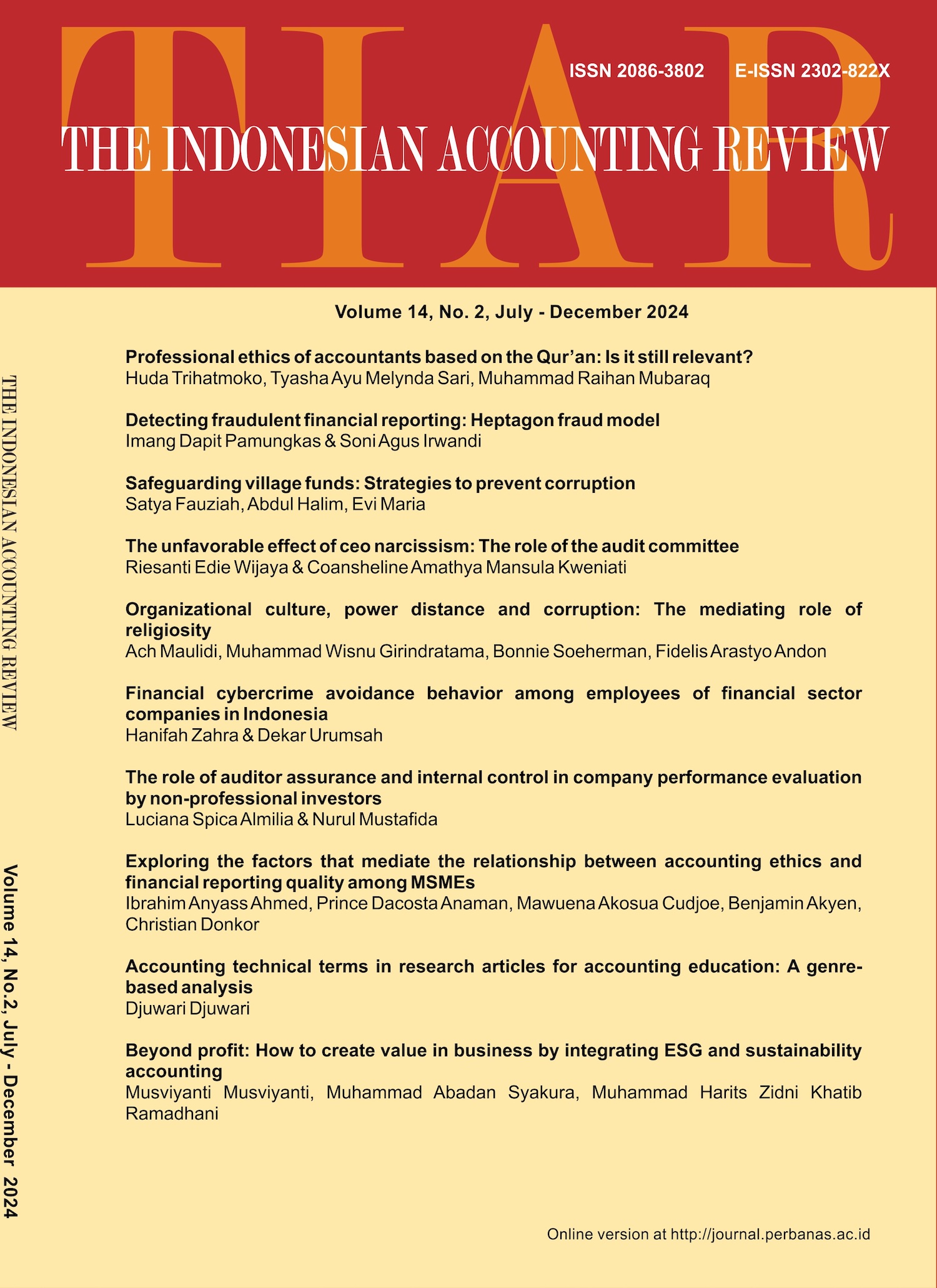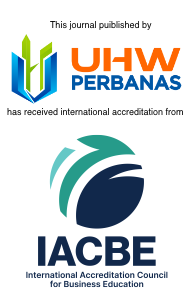Beyond profit: How to create value in business by integrating ESG and sustainability accounting
DOI:
https://doi.org/10.14414/tiar.v14i2.4765Keywords:
ESG investment, Sustainability accounting, Green valueAbstract
This study aims to explore the integration of Environmental, Social, and Governance (ESG) investment with sustainable accounting practices to achieve the Sustainable Development Goals (SDGs) in order to instill important values in sustainable busi-ness. This study is a qualitative study using a case study method at PT Pupuk Kali-mantan Timur (PKT) and its subsidiary, PT Kaltim Industrial Estate (KIE). Data collection was conducted through in-depth interviews. The findings of this study reveal that a proactive approach to ESG adoption is a strategic corporate initiative that emphasizes corporate governance compliance with government regulations, ethical business practices, and fraud prevention. In addition, this study explores insights into the decision-making process related to ESG projects through budget considera-tions for ESG implementation. The results of this study also indicate that there is an important role for management in adopting ESG practices as a company’s commitment to long-term environmental management. The implications of this study are for sustainable development, especially in the fertilizer industry, through the role of an integrated ESG strategy that will ultimately increase corporate profitability, preserve the environment and support the improvement of community welfare. This research contributes to the practical development of sustainability accounting on how industries can integrate sustainable business with environmental responsibility through ESG initiatives to achieve the SDGs.
References
Amel-Zadeh, A., & Serafeim, G. (2018). Why and how investors use ESG information: Evidence from a global survey. Financial Analysts Journal, 74(3), 87-103. https://doi.org/10.2469/faj.v74.n3.2.
Andika, R., Wibowo, H., & Suryadi, T. (2020). Pengaruh limbah cair industri pupuk terhadap kualitas air di perairan. Jurnal Lingkungan dan Ekosistem, 12(4), 112-123.
Aliamutu, K., Bhana, A., & Suknunan, S. (2023). The impact of environmental costs on financial performance: an explorative analysis of two plastic companies. Environmental Economics, 14(1), 13-23. https://doi.org/10.21511/ee.14(1).2023.02.
Ayu, KR., Ulya, H., & Nuryanti. (2024). From profit to purpose: Sustainability and corporate strategy insights from Desa Inspirasi Padi. Bricolage; Jurnal Magister Ilmu Komunikasi, 10(1), 067 - 078
Deegan, C. (2002). Introduction: The legitimising effect of social and environmental disclosures – a theoretical foundation. Accounting, Auditing & Accountability Journal, 15(3), 282-311. https://doi.org/10.1108/09513570210435852.
DiMaggio, P. J., & Powell, W. W. (1983). The iron cage revisited: Institutional isomorphism and collective rationality in organizational fields. American Sociological Review, 48(2), 147-160. https://doi.org/10.2307/2095101
Donaldson, T., & Preston, L. E. (1995). The stakeholder theory of the corporation: Concepts, evidence, and implications. Academy of Management Review, 20(1), 65-91. https://doi.org/10.2307/258887.
Freeman, R. E. (1995). The stakeholder approach revisited. Zeitschrift für Wirtschafts-und Unternehmensethik, 5(3), 228-241.
Gärling, T., Jansson, M. (2021). Sustainable Investment: Consequences for Psychological Well-Being. Sustai-nability, 13(16), 1-10. https://doi.org/10.3390/su13169256.
Gray, R., Adams, C. A., Owen, D. (2014). Accountability, social responsibility and sustainability: Accounting for society and the environment. Pearson Higher Ed.
Greenwood, M. (2007). Stakeholder engagement: Beyond the myth of corporate responsibility. Journal of Business Ethics, 74(4), 315-327. https://doi.org/10.1007/s10551-007-9509-y.
Hartatik, W., & Widowati, W. (2015). Dampak penggunaan pupuk kimia terhadap kualitas tanah dan air. Jurnal Pertanian Berkelanjutan, 23(2), 45-58.
Henisz, W. J., Koller, T., & Nuttall, R. (2019). Five ways that ESG creates value. McKinsey Quarterly.
Ioannou, I., & Serafeim, G. (2015). The impact of corporate social responsibility on investment recommendations: Analysts’ perceptions and shifting institutional logics. Strategic Management Journal, 36(7), 1053-1081. https://doi.org/10.1002/smj.2268.
Jensen, M. C. (2001). Value maximization, stakeholder theory, and the corporate objective function. Journal of Applied Corporate Finance, 14(3), 8-21. https://doi.org/10.1111/j.17456622.2001.tb00434.x.
Jian Li, Zhenghui Pan, Yang Sun, Wei Zheng, Zhisheng Zhang, Zhifang Wang. (2024). From Compliance to Strategy: Paradigm Shift in Corporate ESG Practices. Academic Journal of Humanities & Social Sciences, 7(2): 185-193. https://doi.org/10.25236/AJHSS.2024.070225.
Mitchell, R. K., Agle, B. R., & Wood, D. J. (1997). Toward a theory of stakeholder identification and salience: Defining the principle of who and what really counts. Academy of Management Review, 22(4), 853-886. https://doi.org/10.2307/259247.
Niehaus, G., & Pelton, J. N. (2023). Sustainability and Environmental, Social and Governance (ESG) Investing: The Case of Satellite Companies and Space Debris. New Space, 11(1), 14-25.
OECD. (2015). G20/OECD Principles of Corporate Governance. OECD Publishing.
Putri, L., Ariana, I., Saputra, M. (2021). Environmental cost accounting treat-ment and their effect on financial statements and assessment of sustainability performance at pt alove bali. Journal of Applied Sciences in Accounting Finance and Tax, 4(2),97-104. https://doi.org/10.31940/jasafint.v4i2.97-104.
Suchman, M. C. (1995). Managing legitimacy: Strategic and institutional appro-aches. Academy of Management Review, 20(3), 571-610. https://doi.org/10.2307/258788.
Sugiyono. (2020). Metode Penelitian Kualitatif. Bandung: Alfabeta
Taliento, M., Favino, C., & Netti, A. (2019). Impact of Environmental, Social, and Governance Information on Economic Performance: Evidence of a Corporate ‘Sustainability Advantage’ from Europe. Sustainability, 11, 1-26. https://doi.org/10.3390/su11061738.
Thornton, P. H., Ocasio, W., & Lounsbury, M. (2012). The institutional logics perspective: A new approach to culture, structure, and process. Oxford University Press.
Ting, I. W. K., Azizan, N. A. B., & Kweh, Q. L. (2019). Environmental, social, and governance disclosure and firm performance in Malaysia: An agency theory perspective. International Journal of Managerial and Financial Accounting, 11(2), 145-163.
Yan, S., Ferraro, F., & Almandoz, J. (2019). The rise of socially responsible investment funds: The paradoxical role of the financial logic. Administrative Science Quarterly, 64(2), 466-501. https://doi.org/10.1177/0001839218773324.
Downloads
Submitted
Published
How to Cite
Issue
Section
License
Copyright (c) 2025 The Indonesian Accounting Review

This work is licensed under a Creative Commons Attribution-NonCommercial 4.0 International License.

















